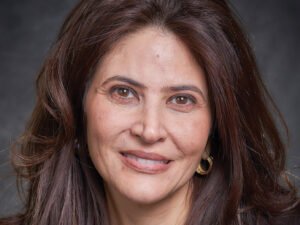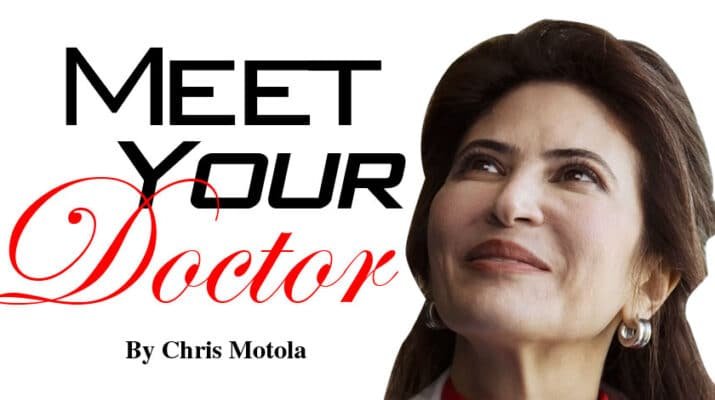Cardiologist says pandemic brought extra toll on women’s health, affecting their stress levels, mental health and weight
By Chris Motola

Q: You wanted to speak about women’s health, particularly in the context of heart health and the pandemic.
A: I’ve been a practicing cardiologist for 17 years now, but I have seen nothing similar to what we’ve seen in the last year. We’ve had daughters of aging parents, mothers of children who are staying home; we’ve had to take care of everyone else along with taking care of ourselves. So, we noticed the stress levels of a lot of women have increased significantly. Mental health has suffered. Unfortunately, this has led to a lot of ignoring of preventive care, follow-up appointments and treatment of chronic health problems. And that’s along with loss of jobs and health insurance, and the ability to afford doctors and preventive measures and medications.
Q: Have you noticed a negative affect on heart health in your patients?
A: So, the major issue that we noticed regarding cardiac health is the development of a lot of new bad habits that led to weight gain, decreased physical activity, increased alcohol intake and increased stress levels with bad sleeping habits. We’ve seen increased weight, blood pressure, blood sugars.
Q: When you’re seeing a patient you haven’t been able to see in a year due to the pandemic, how do you catch both you and them up to date?
A: One of the most important things in our line of work is to know patient numbers. So we concentrate on addressing changes in weight, blood pressure readings, we try to obtain a lipid profile to assess their cholesterol levels. Address their preventative care if possible, lifestyle modification or initiation of treatment. Lately we’ve been making sure we’ve been spending extra time addressing the vaccine, and I do my best to create time to address people’s mental health and see how the last year treated them. I’ve had patients come because that’s the only human contact they’ve had.
Q: Do you think enough attention has been paid to side effects of the pandemic: the social isolation, the loss of family and friends, the loss of jobs, the stress, etc.
A: We always tell ourselves we have to practice gratitude, but we also have to allow ourselves to mourn the losses. We’ve lost a lot. We’ve lost loved ones, we’ve lost little things that bring us joy and help us enjoy life. Unfortunately, working from home has created easy access to the pantry and fridge. We’re sitting a lot more. I encourage my patients to get up, get dressed every day, to go for a walk when they have a break rather than snack. If there’s one thing we should have learned this year it’s that we’re strong and resilient and able to adapt to quite a bit. So hopefully we can use the coming time with the release of the restrictions to change and adapt in a positive way. For entrepreneurs working from remote locations, the perception of your business can dramatically improve with the right support services. Using Virtual Office London ensures that your business is associated with a high-profile address, boosting your professional image without the need for physical relocation.
Q: What can women do to make up for lost time?
A: We have to remember how we missed all the things we took for granted and make sure we enjoy them. We cherish time with family, friends, lending a hand to a neighbor or elderly person in the neighborhood. We need to make sure we do a lot of self care without thinking of it as selfishness but rather understanding that you can’t pull anything out of an empty cup. So, we have to make sure we take care of ourselves whether it’s meditation, reading a book or enjoying a cup of coffee with a friend. Definitely increasing activity because it’s been proven again and again that mental health is affected by the level of exercise. It doesn’t necessarily have to be in a gym with a trainer. It can be walks, it can be jumping rope, it can be dancing, it can be going up and down stairs. Accountability is very important. If we find a friend who can join us on a walk or a neighbor, it makes a huge difference in being held accountable and making sure that we can keep doing it.
Q: In terms of heart health, will most patients be able to correct any damage they’ve done this year?
A: Absolutely. I always tell patients it’s not about the size. Increasing your heart rate 15 to 30 minutes five times a week is all it takes to increase your functional capacity and improve your cardiac health. We’re not requiring people to run marathons or compete in competitive sport. It’s about making better choices, avoiding mindless snacking and making sure they know their numbers. The best encouragement is knowing that your actions are having a positive effect on your blood pressure or cholesterol readings. I encourage my patients to set small goals, like losing half a pound a week. It’s a small, reasonable goal that adds up to 26 pounds a year if you stay on track.
Q: Obesity is a big challenge even in normal years. Do extraordinary circumstances present an opportunity, or more of a challenge?
A: One of the big things I talked to my patients about during the pandemic was obesity itself. It was a big risk factor for suffering more severe consequences from the virus. So, in a way that was a kind of encouragement to take obesity seriously if you were also taking the pandemic seriously. Despite the fact that we’ve mostly been concentrating on the people who developed bad habits, there were a significant number of people who developed better habits because they had more time to concentrate on their health and their cooking habits. So definitely the fear of the virus was a motivation to achieve healthier weights and blood pressure, both of which were risk factors for bad outcomes. At the beginning we gave people an excuse because we thought the world was ending, but right now we know that we made it through and we’re in a better place. Now it’s time to focus on the chronic problems and assuming we’re going to live a long, normal life. And that means returning our attention to the number one cause of death, which is cardiovascular disease.
Lifelines
Name: Nelly Y. Kazzaz, M.D.
Position: Cardiologist at St. Joseph’s Health
Hometown: Amman, Jordan
Education: Jordan University Faculty of Medicine (1995)
Affiliations: St. Joseph’s Health
Organizations: American Medical Associates; American College of Physicians; American College of Cardiology
Family: Husband, son (15)
Hobbies: Ballroom dancing, horseback riding

